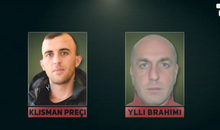
 Flash News
Flash News
Hell in the Gjadri camp, 45 attempted injuries and violent protests
Albanian man who dived into river to save his two deceased children from drowning gets tattooed on their faces
Why World War III is 'speaking', and the Albanian PM Rama is silent
Iran faces near-total internet blackout
Accident on the Grand Ring Road, two cars collide
What is the 14-ton bomb that could destroy Iran's nuclear facility and will Trump use it?
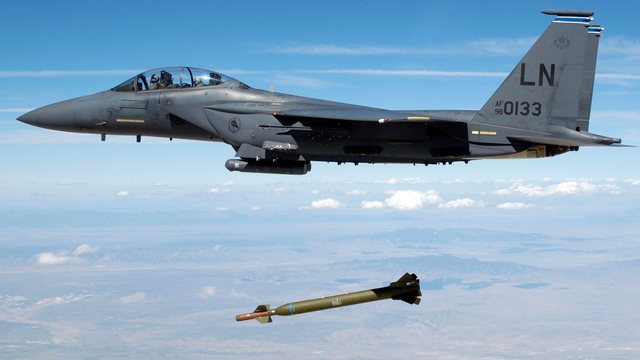
Israel has made no secret of its desire to destroy Iran's nuclear program, but the only bomb believed to be powerful enough to penetrate Iran's Fordow facility is an American "bunker-busting" bomb that the Israelis do not yet have.
As President Donald Trump appears to be switching between calling on Iran to negotiate and threatening retaliation "at levels never seen before," the US will inevitably be drawn into another conflict in the Middle East - something the president has repeatedly said he does not want.
What are bunker busting bombs?
Simply put, bunker busting bombs are designed to explode twice. Once to breach the ground's surface and again after the bomb has sunk to a certain depth.
They are used to reach military headquarters, bunkers, and other facilities buried deep underground.
"They're big, very heavy. There's a lot of explosives in them," says military analyst Michael Clarke.
The Israeli military has a number of bunker-busting bombs, but it does not have the vaunted GBU-57, a 14-ton bomb so heavy that it can only be dropped by the US fleet of heavy bombers.
It is the GBU-57 that is believed to be the only one capable of destroying the heavily defended plant at Fordow.
Analysts say it could only be delivered by a stealth American B-2 bomber. Its weight of 30,000 lb (13,600 kg) means its kinetic force allows it to reach deeply buried targets.
It is understood that it can penetrate about 200 ft (61 m) below the surface before exploding.
What are Iran's main nuclear facilities?
Prime Minister Benjamin Netanyahu has made clear his desire to destroy Iran's nuclear program and any hint of a nuclear weapons threat - something Iran has long denied seeking.
In the days since Israel launched its surprise attack on Iran, much attention has been paid to how well they would be able to disrupt Iran's nuclear program, much of which is buried deep underground.
"The three places they really want are Natanz, Isfahan and Fordow," says Prof. Clarke.
Natanz and Fordow are uranium enrichment sites, and Isfahan is one of the largest nuclear research centers in Iran.
What damage has Israel caused to Iran's nuclear program?
The Natanz enrichment plant has been hit by Israel in recent days, with its underground centrifuge hall believed to have been damaged but not destroyed.
Rafael Grossi, head of the International Atomic Energy Agency, told the BBC that the Natanz plant suffered extensive damage, likely destroying 15,000 centrifuges.
This was probably due to an Israeli airstrike that cut off the centrifuges' power supply, rather than actual physical damage to the centrifuge hall, he said.
However, no damage was observed in Fordow. Mr Grossi added: "There is very limited, if any, damage recorded (there)."
In Isfahan, Iran's third key nuclear site, there was damage to buildings, including the central chemical laboratory and a uranium conversion plant.
Mr. Grossi said: "In Isfahan you also have underground spaces, which do not appear to have been affected."
What will Israel do now?
Professor Clarke says Israel is likely to continue its bombing campaign against Iran's nuclear facilities.
"I think they're going to keep visiting Natanz again," he said. "They're going to want to keep aiming down with more bunker bombs until they hit the centrifuge hall itself."
Fordow, on the other hand, seems very deep even about Israel's bunker bombs.
"It's the most important because it's the one the Iranians think they can protect," he adds. "You have to blow up the mountain to get there."
It is possible, says Professor Clarke, that Israel could try to damage it in a way similar to what happened to Natanz - by cutting off the power supply - which could have the cumulative effect of rendering the centrifuges inoperable.
"What Netanyahu wants to say is: look at the devastation we've caused to Iran. Their weapons program is destroyed, it would take them 30 years to rebuild it... we've taken them off the table as a threat to us for a generation."
But it remains to be seen whether this is possible without direct American intervention - something President Trump may want to avoid at all costs. Adapted from Sky News
Latest news


Zhulali: EU does not tolerate basic standards, membership is a political process
2025-06-18 22:40:09
Recount process/Këlliçi: DP seeks 14th mandate in Tirana
2025-06-18 22:11:20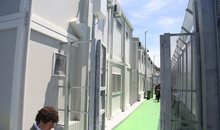
Hell in the Gjadri camp, 45 attempted injuries and violent protests
2025-06-18 21:49:49

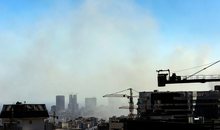
Israel strikes National Police headquarters in Iran, several injured reported
2025-06-18 21:29:11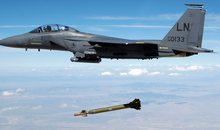




Why World War III is 'speaking', and the Albanian PM Rama is silent
2025-06-18 20:08:03
Avoid drying towels in the sun, here's how to keep them soft
2025-06-18 20:07:53

Cannabis legalization in Albania, new law, old risks
2025-06-18 19:39:54

Pope Leo XIV calls for peace: Advanced weapons are temptations we must reject
2025-06-18 19:22:29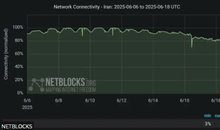
Iran faces near-total internet blackout
2025-06-18 19:07:09




INSTAT: Heart diseases, the leading cause of death in Albania during 2024
2025-06-18 18:05:33



Trump does not rule out the possibility of striking Iran
2025-06-18 17:19:35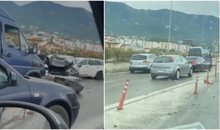
Accident on the Grand Ring Road, two cars collide
2025-06-18 17:05:57
Kume: Vote recount increases credibility
2025-06-18 16:59:38


Ndërron jetë ish-futbollisti dhe trajneri i njohur shqiptar
2025-06-18 16:17:02
EU calls for "comprehensive reforms" for the media in Albania
2025-06-18 16:06:20
Macron convenes France's Defense and Security Council
2025-06-18 16:04:29
Israeli attacks in the last 24 hours, at least 140 killed in Gaza
2025-06-18 15:58:13
Reflection on Rama's kneeling before Meloni
2025-06-18 15:52:53

Conference League second round draw, Albanian teams learn potential opponents
2025-06-18 15:29:29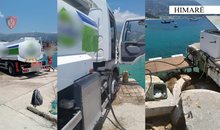

Eurostat 2024: Prices in Albania are catching up with EU levels
2025-06-18 15:07:03
War/ Why is Russia hesitant to help Iran in its conflict with Israel?
2025-06-18 15:00:19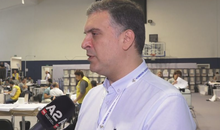
Blushi: Ilir Meta's voice will resound louder than ever in the new Parliament
2025-06-18 14:50:42



The Electoral College also rejects the DP's complaint for Kukës and Gjirokastra
2025-06-18 14:09:49
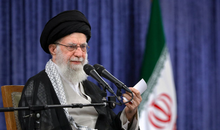
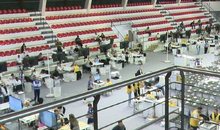
The College rejects the DP's request for invalidation of the elections in Lezha
2025-06-18 13:41:57
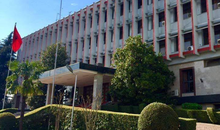
Evacuation of 5 Albanians from Israel, 3 of them arrive in Albania
2025-06-18 13:23:34
Amidst chaos and abuse, is Albania ready to offer sustainable tourism?
2025-06-18 13:01:56

SMILE.al - 5 years of history, the best version of success!
2025-06-18 12:42:25

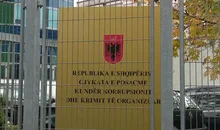

Causes of death in Albania, heart disease leads, suicides increase
2025-06-18 11:47:36



The claim for Jorgo Goro is postponed
2025-06-18 10:59:17

Gave candy and attempted to abuse minor, 60-year-old arrested in Maliq
2025-06-18 10:33:10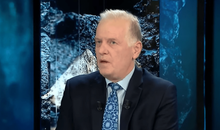
Israel, Iran, us and our world
2025-06-18 10:21:43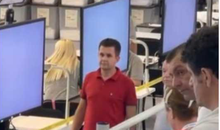
Vote recount for Tirana, Ilir Alimehmeti also present in the process
2025-06-18 10:13:14

Why is Russia hesitant to help Iran in its conflict with Israel?
2025-06-18 10:00:55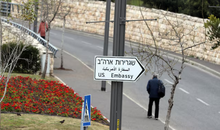
Israel-Iran War/ US Embassy in Jerusalem Temporarily Closed
2025-06-18 09:42:06
"I wanted to become a writer", Berisha recounts his dream left half-abandoned
2025-06-18 09:33:52
Author of several thefts, thief from Tirana caught in Durrës (NAME)
2025-06-18 09:24:20

Taksa të larta dhe diskrimin, pse emigrantët po largohen përsëri nga Gjermania?
2025-06-18 09:02:32
Socially dangerous person, 27-year-old arrested in Pogradec
2025-06-18 08:51:39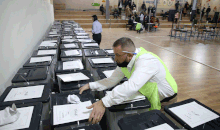
The recount of votes for the Tirana district begins today
2025-06-18 08:37:37

Horoscope, what do the stars have in store for you today?
2025-06-18 08:12:05

Morning Post/ In 2 lines: What mattered yesterday in Albania
2025-06-18 07:45:20


Former prosecutor: Criminal groups are more structured in Albania
2025-06-17 22:02:21



Korça/ A woman comes into contact with electricity
2025-06-17 20:55:40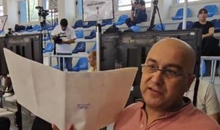

Death makes you neither good nor bad.
2025-06-17 20:38:05
Only 1 in 5 tourists sleep in apartments or hotels
2025-06-17 20:25:16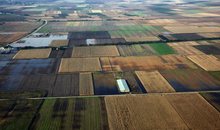

European Commission proposes complete ban on Russian gas imports
2025-06-17 19:46:58
'Serious concern': EU condemns government attacks on SPAK after Veliaj's arrest
2025-06-17 19:36:01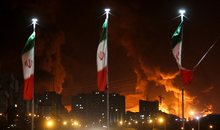
Fuel prices soar amid Israel-Iran tensions
2025-06-17 19:19:12


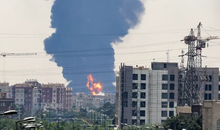
Iranian military says it struck Israeli military intelligence center in Tel Aviv
2025-06-17 18:17:27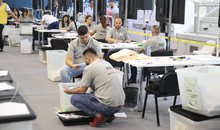
The recount of 94 boxes of Gramsh and Peqin is completed
2025-06-17 18:08:47
Source: The world order is destroyed, how is the world being run today
2025-06-17 17:50:28
